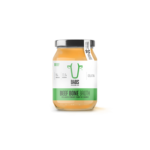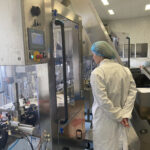Every time you buy local food, you’re making a choice that benefits your health, your community and the environment. When you think about it, buying local is one of the most impactful and rewarding steps we can take to make the world a better place. It’s a simple lifestyle shift that can change everything.
Buying local as an individual choice forms the foundation for a culture that supports everyone. This includes you and your family, local businesses and the people who devote their lives to bringing whole, organic, sustainable foods to your table.
You become more connected to your food
When you learn more about where your food comes from, you develop a deeper connection with the food you put into your body and serve to your family. Knowing the story behind the farm and understanding the ethos of the producer, the whole experience of cooking and preparing food takes on a whole new level of meaning.
You pay more attention to what you’re putting in your body
It’s so much easier to learn the details of the food production process when you’re getting your food from local farmers. On local producers’ websites, usually everything is transparent so you know what livestock are fed, how animals are treated and how crops are grown and managed. Contrast this to national and even global food production companies that offer more marketing information on their websites than actual details about how food is produced and processed.
You’re sending a message every time you shop
With every local food purchase, you’re essentially voting to support sustainable food production and small artisan growers and sellers. As you learn more about local growers and even interact with these amazing people, you’ll find the ones who you believe in — then, by buying from them, you are keeping them in business and keeping their vision alive.
When you buy local, you put more money into your community
When you spend most of your food budget at a large supermarket, your money is going to various businesses along the supply chain, most of which are big businesses located outside of your area. Buy local, and you put more money back into your community. This creates a positive ripple effect. When local farmers and their employees thrive, they have more money to spend locally and they contribute more money to the community through paying taxes.
Buying local food supports other local small businesses
In communities with thriving local food producers, other businesses benefit as well. Restaurants, coffee shops, ice cream shops and others are more inclined to use fresh local ingredients in their products to attract customers who are in tune with local food culture. This then supports local growers even further.
Choosing local food brings the community together
When you look at cities that already have a thriving local, sustainable food culture, from Amsterdam to Austin, Texas, you’ll find something really special brewing — a strong sense of community. Individuals have more opportunities to make a positive difference every time they buy food. Along the way they learn. They connect. And the goodwill, the great flavors, the good health — it keeps spreading and enriching the local culture and the local economy.
WHY LOCAL FOOD MAY BE BETTER FOR YOUR BODY
The other huge reason to buy local food as much as possible is your health. Buying fresh, locally grown produce that doesn’t have to travel far to reach your table may offer your body more nutrients and a more nourishing experience with every meal.
More enzymes
The fresher your food, the more active enzymes that are still readily available when you sit down to eat. These enzymes are what make a whole food diet so important — they are literally the life force we receive from the food we consume. Enzymes are proteins that determine the speed of chemical reactions in the body responsible for key functions such as digestion, healing and growth. Eating a diet high in heavily processed foods means you’re not getting as many enzymes, which can slow these critical processes down.
Seasonal variety
When you buy local, you eat seasonal food, which is always the highest quality produce in the market. You’ll enjoy a variety of fruits, veggies, herbs and more that are at their freshness peak, which means optimal flavor and nutrition.
Greater nutrient density
Traditional, earth-friendly farming methods tend to produce foods that are higher in antioxidants, vitamins and minerals. For example, organic production helps to protect the soil and water, ensuring more nutrients in both crops and livestock. Commercial farming focuses more on producing high yields at low prices. As a result, you end up losing a lot of the nutrients along the way from the use of chemicals, because the soil isn’t as rich, and because livestock aren’t allowed to live and grow in a way that encourages their health.
Fresh tastes so much better
When food is picked at the peak of freshness, you’ll taste the true flavors as nature had intended. Compare the sweet, sunshine-bright flavor of a homegrown tomato to the dull taste of out-of-season supermarket tomatoes and you’ll understand the pure joy of eating local.
You can avoid pesticides
Generally, local food producers strive to use organic methods and they don’t use pesticides on their crops. This means you can keep these chemicals out of your body.
Food is safer
When you buy food at the supermarket that was grown in one area, processed somewhere else, then packaged and transported, it has to pass through different businesses, all of which may have their own standards for health and safety. With local food, you can check the specifics of what a local producer does to ensure food safety, giving you peace of mind.
This is also critical for anyone on a special diet or who has food sensitivities or allergies. When you buy local, you can ensure your food is free from any chemicals, hormones or factors that could trigger an allergic reaction.
Eat preservative-free
Because your food isn’t traveling long distances to reach your table — and isn’t likely to be stored for weeks or months before purchase — there’s no need to add all the preservatives and other chemical ingredients that a lot of mass-produced food contains to keep it fresh.
What is bone broth?
The methods for making bone broth today have been modernized for efficiency, sanitation,...
Read MoreWhat is gelatin?
Gelatin is a great source of nutrients that are widely beneficial to your...
Read MoreWHY EATING LOCAL IS MORE SUSTAINABLE
Beyond your well-being and your local community, eating local could be one of the keys to protecting the Earth. This is because mass food production and transport are huge strains on the environment. You can shift the momentum from pollution and unsustainable practices to promise and sustainability by choosing to buy local. Here’s why.
Fewer CO2 emissions
Eating local reduces carbon dioxide emissions by shortening the journey your food takes. The fewer miles your food travels, the less air pollution. When you add up all the carbon emissions from food shipments sent by air, ship and road, you have a major problem. When you buy from a local farm less than an hour’s drive away, you’re eliminating one of the planet’s largest sustainability obstacles.
Responsible resource use
Large-scale farming involves the use of excessive amounts of water, as well as chemicals such as fertilizers and pesticides. This depletes our most precious resources, while also contaminating soil, water and air with toxins that harm the entire ecosystem. Local small-scale farmers who practice organic farming and other eco-minded techniques don’t strain the environment. In fact, they can actually improve the health of the ecosystem, making it richer and more capable of sustaining future growth.
Biodiversity protection
Commercial farms use a limited number of genetic strains, offering only the types of crops or livestock that are the heartiest and cheapest to produce at scale. This, over time, shrinks the genetic diversity. Small-scale farmers can plant and grow a greater variety, enhancing our options as consumers, while also supporting biodiversity, which is critical for everyone’s survival.
How to Buy Local
No matter where you live, there are plenty of opportunities for buying local and learning the story of your food.
- Find out where and when your area farmers markets are happening and plan your food shopping around them. Farmers markets are golden opportunities for sourcing local produce, meats, artisan breads and more. This is also a great place to talk to farmers and food producers.
- Look for food co-ops in your area. Cooperative grocers and organic food delivery services are great resources for buying local, sustainable produce, dairy, meat and fish, and pantry items. Generally, you can purchase most of your food all from one source, knowing that each bunch of carrots and dozen eggs was produced on area farms by farmers who adhere to eco-friendly and humane practices. These services are incredibly convenient, offering both delivery and local pickup.
- Visit your local butcher, bakeries, creamery and other specialist food sellers. You’ll find incredible tasting, high-quality breads, cheeses, meats and more that you can add to your plate. Finding your area’s artisan food sellers is also a great way to support local small businesses.
- When you do visit the supermarket, look for the local produce, dairy products, meats, honey and other items. A lot of grocery businesses today are offering local food to meet the increased demand.
SUPPORTING LOCAL IS ENDLESSLY REWARDING
Buy local and cook with fresh, healthy ingredients, and you’re not just supporting your health, but also the health and well-being of the ecosystems that we’re all a part of. It’s a way of returning to the old ways of growing and food production. These old ways respect the earth, the animals and the people who work the land. By turning back to these roots, we’re standing for the values that are often ignored today, but that will sustain us tomorrow.
Have fun exploring your local resources for healthy, organic and delicious foods. I promise you’ll be rewarded in ways richer than you expected.











